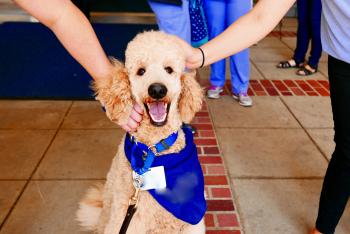As New Jersey schools move to restrict cell phone use during the school day, families and behavioral...
Read More
ABA therapy through Proud Moments at Inspira empowers children diagnosed with autism spectrum disorder (ASD) to reach their full potential by building confidence, independence and meaningful connections. Families often see lasting improvements in daily routines, relationships and quality of life.
Proud Moments at Inspira is a specialized therapy program that supports children and adolescents diagnosed with ASD. Through an evidence-based, personalized approach, children receive one-on-one support that targets key development areas. The goal is to help each child gain greater independence and confidence while improving their ability to navigate the world around them.
Applied Behavior Analysis (ABA) therapy is especially beneficial for individuals who struggle with communication delays, repetitive behaviors, sensory sensitivities or transition and social interaction challenges. Proud Moments at Inspira helps build a foundation for long-term growth by meeting children where they are and supporting them in their natural environments.
You can start the process by undergoing an evaluation at one of Inspira's Autism Diagnostic Centers. Once diagnosed, you can schedule an initial consultation at one of the Proud Moments at Inspira locations, where families can share concerns, ask questions and schedule an evaluation. Once your child receives an autism diagnosis and ABA therapy is recommended, we’ll work with you to begin the intake process.
While every child’s journey is different, families can expect meaningful improvements in daily life, from smoother routines and improved communication to better emotional regulation and social engagement. Our goal is to create a consistent, supportive experience where your child feels safe to grow and you feel confident and empowered as a caregiver.
Proud Moments at Inspira offers a range of services to support children’s unique developmental needs:

Therapy focuses on building both verbal and non-verbal communication. It may include augmentative and alternative communication (AAC) devices to help children express their needs and engage more effectively.

Children learn to navigate social situations, understand nonverbal cues and manage their emotions, helping them form meaningful connections and respond more calmly to everyday challenges.

These sessions teach essential life skills such as getting dressed, brushing teeth, following routines and practicing safety awareness to build a foundation for greater independence.

Therapists use structured, evidence-based strategies to address behaviors like tantrums, aggression and self-injury, replacing them with safer, more effective ways to communicate and cope.
Applied Behavior Analysis (ABA) therapy breaks down complex skills into manageable steps and reinforces positive behaviors through structured, data-driven techniques. This approach is delivered through a thoughtful, family-centered process that supports each child’s developmental needs while ensuring parents and caregivers feel empowered and involved at every step.
From intake through ongoing care, our dedicated intake and authorization team gathers essential information and secures insurance approvals for care. Once approved, a board certified behavior analyst (BCBA) conducts a thorough assessment and creates a personalized treatment plan tailored to the child’s unique goals.
During implementation, a BCBA and trained behavior technicians (BTs) provide therapy in a setting that aligns with the family's needs, with scheduling options that accommodate families’ routines, including evenings. Senior clinicians oversee regular progress reviews using measurable data, adapt treatment plans as needed and provide families with training and tools to continue supporting their child’s growth outside therapy sessions. This comprehensive model helps families feel supported and informed throughout treatment.
ABA therapy supports a wide range of goals, from improving communication and social skills to reducing problem behaviors and increasing independence. Goals are tailored to your child’s age, abilities and daily routines. Goals may include learning to ask for help, increasing participation in group activities or mastering basic self-care tasks.
ABA therapy varies depending on each child’s needs, goals and progress. Some children participate for a few months to target specific skills, while others benefit from ongoing therapy over several years. A behavior analyst regularly reviews and adjusts treatment plans to ensure therapy stays effective and relevant.
Yes, most children continue to attend school while participating in ABA therapy. Therapy sessions can be scheduled around school hours, depending on your child’s needs and family’s preferences. The goal is to support your child’s learning, not replace or interrupt it.
Parents and caregivers are essential partners in the therapy process. You’ll receive training and guidance to help apply ABA strategies at home and beyond. When families are actively involved, it increases consistency and helps children generalize their skills to daily life, making progress more meaningful and long-lasting.
If you or a loved one need crisis support, we're here to help. You can contact the New Jersey Suicide Crisis and Prevention Hotline 24/7 at 988 for immediate assistance.
For local assistance, you can also contact:

As New Jersey schools move to restrict cell phone use during the school day, families and behavioral...
Read More
This article explores how service dogs, emotional support animals and therapy dogs enhance the well...
Read More
Voluntary stays offer a proactive, empowered approach to mental health care by allowing individuals...
Read More